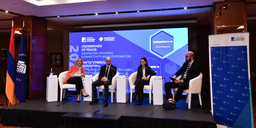
Following recent developments, the Nagorno-Karabakh conflict between Armenia and Azerbaijan was addressed during a meeting at TEPAV.
ANKARA - TEPAV held a roundtable meeting on Thursday, July 7, 2011, with the theme "Peace or War in the Caucasus: Where now for Nagorno-Karabakh?" to discuss the Nagorno-Karabakh conflict and efforts to bring an end to it that have flourished in recent days. Thomas de Waal, senior associate in the Russia and Eurasia Program at the Carnegie Endowment for International Peace, was the keynote speaker of the meeting. Once again, the meeting pointed at the future for the solution of the conflict between Azerbaijan and Armenia.
Speaking during the meeting, de Waal, an expert on unresolved disputes, assessed the latest developments in the Nagorno-Karabakh conflict following the meeting of the two parties on June 24. De Wall talked about the settlement that had formed the agenda of the meeting, which had been inconclusive despite the expectations for a consensus on the basic principles for conflict settlement. He said that one of the important details about the 14-article settlement was that the final status of the region to be decided via a referendum was postdated. He stressed that he as well considered this to be the only feasible alternative under the current circumstances. He added that with each passing day, Nagorno-Karabakh was starting to look more like an Armenian region with the currency used and the Armenian companies founded.
Domestic resistance is influential
De Waal emphasized the negative opinion among the Azerbaijanis and Armenians, but stated that domestic resistance was not as strong as the international pressure. He maintained that while Armenia had been unwilling in the efforts for solution mobilized two years earlier, this time Azerbaijan, which had developed in economic and military terms, was reluctant about a solution.
Stressing that the ongoing process was a "conflict" by all means, de Waal said that though no bright picture for a solution existed, it was impossible to ignore the conflict and thus the diplomacy had to remain active. He also touched upon the huge political as well as economic and human cost of the conflict for Azerbaijan, Armenia and the region.
De Waal maintained that in the context of its relations with Azerbaijan and Armenia, Turkey had to maintain a policy of silent diplomacy.
The meeting highlighted that the domestic resistance to the solution of the conflict was directed not against peace but against the concessions the parties would have to make to establish peace. It was also discussed that the public opinion could be changed with the influence of the respective governments. The discussions in the meeting focused on the peace efforts by Russia, the USA and France as well as the potential impacts of the upcoming elections in these countries, the attitude of Iran, and the communication between the direct and indirect parties.




